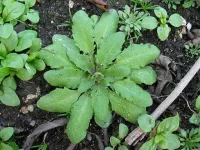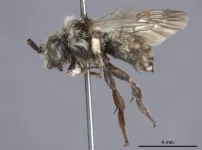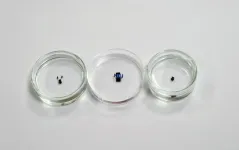(Press-News.org) DUBLIN, June 15, 2021 - Scientists have identified how and why some Covid-19 patients can develop life-threatening clots, which could lead to targeted therapies that prevent this from happening.
The work, led by researchers from RCSI University of Medicine and Health Sciences, is published in the END
Researchers identify why COVID-19 patients develop life-threatening clots
New insights could lead to new therapies for COVID-19
2021-06-15
ELSE PRESS RELEASES FROM THIS DATE:
NIH study offers new evidence of early SARS-CoV-2 infections in US
2021-06-15
A new antibody testing study examining samples originally collected through the National Institutes of Health's All of Us Research Program found evidence of SARS-CoV-2 infections in five states earlier than had initially been reported. These findings were published in the journal Clinical Infectious Diseases. The results expand on findings from a Centers for Disease Control and Prevention study that suggested SARS-CoV-2, the virus that causes COVID-19, was present in the U.S. as far back as December 2019.
In the All of Us study, researchers analyzed more than 24,000 stored blood samples contributed ...
CNIO researchers discover that a protein that facilitates DNA repair may potentiate chemotherapy
2021-06-15
Chemotherapy kills tumour cells by causing damage to them. One of the most effective ways of causing damage is to prevent the two DNA strands from separating so that the cellular machinery cannot read the instructions written in the genes. But sometimes, the cell manages to repair the damage and survive, evading the effect of chemotherapy. CNIO researchers have found out how the cell does that and plan to use this knowledge to enhance cancer treatments.
The key lies in a peculiar protein called PrimPol, as explained in a publication in The EMBO Journal by the CNIO's DNA Replication Group, led by Juan Méndez.
The DNA molecule harbours the genes that direct the life of the cell and, ...
Accomplished University of Ottawa professors earn Canada Research Chairs
2021-06-15
The University of Ottawa has been awarded four new Canada Research Chairs (CRC) that will strengthen its expertise in artificial intelligence, health and law. The University is also proud to announce the renewal of two CRCs that will conduct leading-edge research in quantum communications and photonics.
"The Canada Research Chairs Program provides invaluable support to our researchers as they forge their paths of discovery at a world-class level," said Sylvain Charbonneau, vice-president, research. "The results of this most recent competition will ...
COVID-19 reinfection rate less than 1% for those with severe illness
2021-06-15
A review of more than 9,000 U.S. patients with severe COVID-19 infection showed less than 1% contracted the illness again, with an average reinfection time of 3.5 months after an initial positive test. Those are the findings from a study conducted by researchers from the University of Missouri School of Medicine and MU Health Care.
The researchers teamed up with the MU Institute for Data Science and Informatics and the Tiger Institute for Health Innovation to review data from 62 U.S. health care facilities. They found 63 of the 9,119 patients (0.7%) with severe COVID-19 infection contracted the virus a second time, with a mean reinfection period of 116 days. Of the 63 who were reinfected, two (3.2%) died. Patients categorized as ...
Plants use a blend of external influences to evolve defense mechanisms
2021-06-15
Plants evolve specialised defence chemicals through the combined effects of genes, geography, demography and environmental conditions, a study published today in eLife reports.
The findings reveal a pattern in the types of defence chemicals plants produce across Europe, and describe some of the evolutionary processes that create them.
As plants are immobile organisms, they rely on producing defence chemicals called specialised metabolites for survival. Specialised metabolites have extensive variation in their structure, such as the number of carbon molecules ...
Rarest bee genus in North America is not so rare after all
2021-06-15
June 15, 2021 - Canadian researchers have discovered that a bee thought to be one of the rarest in the world, as the only representative of its genus, is no more than an unusual specimen of a widespread species.
Scientists with the Canadian Museum of Nature (CMN) and York University have reclassified the mystery bee, collected somewhere in Nevada in the 1870s, as Brachymelecta californica. They note that it's an aberrant individual of a species, the California digger-cuckoo bee, that is part of a group that includes five other species. All are cleptoparasitic bees, with females that lay eggs in the nests of digger bees. Brachymelecta californica itself is known to be widespread ...
Medication may help heavy-drinking smokers improve their health
2021-06-15
A recent UCLA clinical trial has shown encouraging results in helping daily smokers who are also heavy drinkers quit smoking and cut down their alcohol intake.
The study of 165 people tested two prescription drugs -- varenicline, for smoking addiction, and naltrexone, which is used to treat alcoholism. Studies have shown that varenicline, marketed under the brand name Chantix, may also be effective in reducing alcohol consumption.
Participants, who ranged in age from 21 to 65, smoked at least five cigarettes a day, with male participants generally consuming more than 14 drinks a week and women more than seven per week.
Over the 12-week study period, each participant received 2 milligrams of varenicline twice a day. Roughly half the group -- 83 participants -- also received a 50-milligram ...
Hippos and anthrax
2021-06-15
Hippopotamus aren't the first thing that come to mind when considering epidemiology and disease ecology. And yet these amphibious megafauna offered UC Santa Barbara ecologist Keenan Stears(link is external) a window into the progression of an anthrax outbreak that struck Ruaha National Park, Tanzania, in the dry season of 2017.
Through surveys and GPS monitoring, Stears and his colleagues, Wendy Turner, Doug McCauley and Melissa Schmitt, revealed that reduced dry-season flows in the Great Ruaha River indirectly spread the disease by affecting hippo movement. The results, which appear in the journal Ecosphere(link is external), present a unique perspective on disease ecology and illustrate how anthropogenic changes can impact wildlife and human health.
The ...
Scientists make highly maneuverable miniature robots controlled by magnetic fields
2021-06-15
A team of scientists at Nanyang Technological University, Singapore (NTU Singapore) has developed millimetre-sized robots that can be controlled using magnetic fields to perform highly manoeuvrable and dexterous manipulations. This could pave the way to possible future applications in biomedicine and manufacturing.
The research team created the miniature robots by embedding magnetic microparticles into biocompatible polymers -- non-toxic materials that are harmless to humans. The robots are 'programmed' to execute their desired functionalities when magnetic fields are applied.
The made-in-NTU robots improve on many existing small-scale robots by optimizing their ability to move ...
Is artificial intelligence the key to preventing relapse of severe mental illness?
2021-06-15
Is artificial intelligence the key to preventing relapse of severe mental illness?
New AI software developed by researchers at Flinders University shows promise for enabling timely support ahead of relapse in patients with severe mental illness.
The AI2 (Actionable Intime Insights) software, developed by a team of digital health researchers at Flinders University, has undergone an eight-month trial with psychiatric patients from the Inner North Community Health Service, located in Gawler, South Australia.
The digital tool is tipped to revolutionise consumer-centric timely mental health treatment provision outside hospital, with researchers labelling it as readily available and scalable.
In the trial of 304 ...
LAST 30 PRESS RELEASES:
Scientists show how to predict world’s deadly scorpion hotspots
ASU researchers to lead AAAS panel on water insecurity in the United States
ASU professor Anne Stone to present at AAAS Conference in Phoenix on ancient origins of modern disease
Proposals for exploring viruses and skin as the next experimental quantum frontiers share US$30,000 science award
ASU researchers showcase scalable tech solutions for older adults living alone with cognitive decline at AAAS 2026
Scientists identify smooth regional trends in fruit fly survival strategies
Antipathy toward snakes? Your parents likely talked you into that at an early age
Sylvester Cancer Tip Sheet for Feb. 2026
Online exposure to medical misinformation concentrated among older adults
Telehealth improves access to genetic services for adult survivors of childhood cancers
Outdated mortality benchmarks risk missing early signs of famine and delay recognizing mass starvation
Newly discovered bacterium converts carbon dioxide into chemicals using electricity
Flipping and reversing mini-proteins could improve disease treatment
Scientists reveal major hidden source of atmospheric nitrogen pollution in fragile lake basin
Biochar emerges as a powerful tool for soil carbon neutrality and climate mitigation
Tiny cell messengers show big promise for safer protein and gene delivery
AMS releases statement regarding the decision to rescind EPA’s 2009 Endangerment Finding
Parents’ alcohol and drug use influences their children’s consumption, research shows
Modular assembly of chiral nitrogen-bridged rings achieved by palladium-catalyzed diastereoselective and enantioselective cascade cyclization reactions
Promoting civic engagement
AMS Science Preview: Hurricane slowdown, school snow days
Deforestation in the Amazon raises the surface temperature by 3 °C during the dry season
Model more accurately maps the impact of frost on corn crops
How did humans develop sharp vision? Lab-grown retinas show likely answer
Sour grapes? Taste, experience of sour foods depends on individual consumer
At AAAS, professor Krystal Tsosie argues the future of science must be Indigenous-led
From the lab to the living room: Decoding Parkinson’s patients movements in the real world
Research advances in porous materials, as highlighted in the 2025 Nobel Prize in Chemistry
Sally C. Morton, executive vice president of ASU Knowledge Enterprise, presents a bold and practical framework for moving research from discovery to real-world impact
Biochemical parameters in patients with diabetic nephropathy versus individuals with diabetes alone, non-diabetic nephropathy, and healthy controls
[Press-News.org] Researchers identify why COVID-19 patients develop life-threatening clotsNew insights could lead to new therapies for COVID-19






